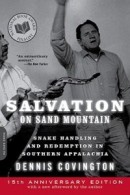Every Thursday on the blog brings a post about a paperback book.
 In his mid-30s, Dennis Covington was feeling depressed. A college English teacher who felt that his job was “minor and absurd,” he yearned for an adventure “in which the risks were real.” He found one. After reporting on the trial of an Alabama preacher who was accused of trying to kill his wife with poisonous snakes, Covington immersed himself in the Appalachian world of holy snake handlers. The resulting book, Salvation on Sand Mountain
In his mid-30s, Dennis Covington was feeling depressed. A college English teacher who felt that his job was “minor and absurd,” he yearned for an adventure “in which the risks were real.” He found one. After reporting on the trial of an Alabama preacher who was accused of trying to kill his wife with poisonous snakes, Covington immersed himself in the Appalachian world of holy snake handlers. The resulting book, Salvation on Sand Mountain, was recently reissued to mark its 15th anniversary.
As subcultures go, this one is pretty nuts. The snake handlers believe that the Bible asks a chosen few to take up serpents as a show of faith. When a handler named Brother Clyde is bit on both hands, another church member, Cecil, tells Covington that Clyde hadn’t been fully anointed to handle the creature, and that “You’d have to be crazy to go and pick up a snake like that.”
“Do you know Punkin Brown?” Cecil asked.
I shook my head.
“Brother Punkin is from Newport, Tennessee,” he said. “Now there’s a man who really gets anointed by the Holy Ghost. He’ll get so carried away, he’ll use a rattlesnake to wipe the sweat off his brow.” Cecil paused and glanced around the square. “That brother Clyde, though. He must have been a little mentally ill.”
In a community that draws such lines, there is obviously a lot of unintentional humor to be mined, and Covington does the job, as in this reaction to a woman who describes a hospital visit to him:
“You know, a whole lot of them doctors are against serpent handling.”
I told her I bet they were.
But Covington invites some of this same sarcastic reaction from his readers. On page 196, about 80% of the way through the book, after learning that a handler was bitten by “a four-foot rattler whose fangs went so deep they had to pry the snake off of him,” Covington realizes that “I was in way over my head.”
No kidding, Dennis.
During his research, Covington discovers that his great-great-grandfather was a Methodist preacher in the very parts of Alabama where he’s spending much of his time. (“I have no reason to believe he took up serpents,but I do have reason to believe he was a precursor of those who eventually did.”) With a sense that he’s learning something vital and primordial about himself, Covington is drawn further and further into the handlers’ world (at one point taking up a snake himself), and though he convincingly charts his emotional responses, it’s occasionally difficult to reconcile his smart, skeptical, reportorial side with the leap it must have taken to start feeling truly at home among the handlers.
But the book is both breezy (written in what might be called Smart Magazine style) and engaged with substantive spiritual issues, if that’s not an oxymoron. And it builds to a riveting climactic scene, in which the limits of tolerance and understanding are dramatically reached. In a new afterword, written earlier this year, Covington looks back on the experience and says that he was “taken in by the handlers, but not bamboozled.”

